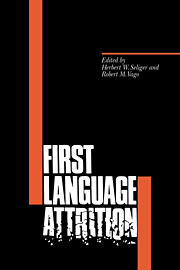Book contents
- Frontmatter
- Contents
- List of figures
- List of tables
- List of contributors
- Acknowledgment
- Part I Survey studies
- 1 The study of first language attrition: an overview
- 2 First language attrition and the parameter setting model
- 3 Recapitulation, regression, and language loss
- 4 First language loss in bilingual and polyglot aphasics
- 5 A crosslinguistic study of language contact and language attrition
- Part II Group studies
- Part III Case studies
- Index
2 - First language attrition and the parameter setting model
Published online by Cambridge University Press: 14 January 2010
- Frontmatter
- Contents
- List of figures
- List of tables
- List of contributors
- Acknowledgment
- Part I Survey studies
- 1 The study of first language attrition: an overview
- 2 First language attrition and the parameter setting model
- 3 Recapitulation, regression, and language loss
- 4 First language loss in bilingual and polyglot aphasics
- 5 A crosslinguistic study of language contact and language attrition
- Part II Group studies
- Part III Case studies
- Index
Summary
Introduction
The focus of this paper, which is based on a reading of investigations into attrition reported in the literature, will be theoretical. It will consider the relevance of recent ideas in the learnability literature including the notions of “input” and “evidence” and their potential relevance for the analysis and explanation of attrition data. This means that the central concern will be the usefulness of such concepts as Universal Grammar (UG) as discussed within a Chomskyan framework, and related concepts such as markedness and parameter setting. In other words, the examples presented in the course of the discussion will serve to illustrate the appropriate theoretical problems raised by these concepts. It is, therefore, necessary to consider what kinds of questions an application of more recent versions of the Chomskyan perspective to attrition studies would raise with regard to the interpretation of attrition data. It is also necessary to see what kinds of implication could be drawn as far as data elicitation techniques are concerned. Data reported in the literature will be used to illustrate both questions of interpretation raised by the theory as well as the need for special testing techniques for collecting data.
Competence and performance attrition
In Sharwood Smith (1983a and 1983b), attrition problems were examined in the light of, amongst other things, the basic Chomskyan distinction between competence and performance (see also Sharwood Smith 1989).
- Type
- Chapter
- Information
- First Language Attrition , pp. 17 - 30Publisher: Cambridge University PressPrint publication year: 1991
- 23
- Cited by



